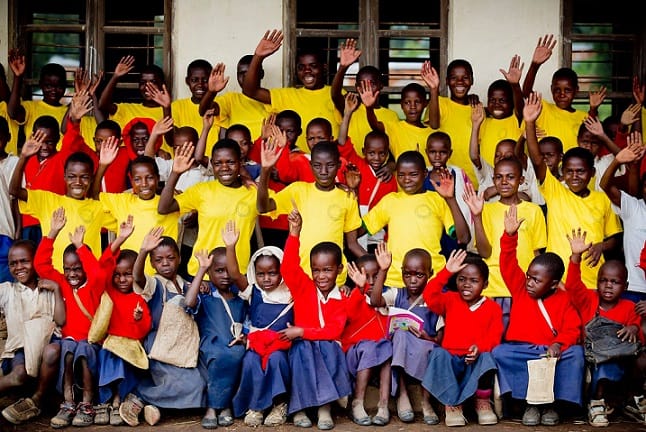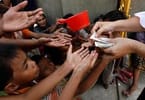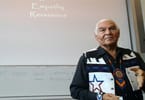With preparations going on to celebrate the Day of the African Child next week, over 250 million primary and secondary African school children are out of school in Africa due to the COVID-19 pandemic, waiting on the African governments to re-open schools.
Rich in natural resources with ample land for farming and wildlife resources for tourism, Africa is still lacking adequate learning facilities and government backing to provide quality education to the children.
The World Bank estimated that 87 percent of children in sub-Saharan Africa are facing poor learning and lack functional skills in a dynamic labor market.
A report released by various educational research organizations indicated that the shutdown of schools in Africa can bring negative impacts to millions of children prior to the COVID-19 pandemic.
Waiting to celebrate The Day of the African Child, most of school children on the continent are lacking school meals and sanitary pads while immunization services have been disrupted at this time when schools are closed.
The various stopgap measures to continue learning are not suitable for Africa and could in some instances amplify learning inequalities. Remote learning platforms require Internet access and hardware that is inaccessible to rural and poor households.
A recent report released by Brookings estimated that less than 25 percent of low-income countries can provide remote learning opportunities compared to about a 90 percent adoption rate in high-income countries.
Widely-accessible mediums of communication like radio and television are centered in cities and other urban centers, leaving those children in rural areas of Africa languishing in poor learning environments.
Based on the effectiveness of social distancing in reducing the coronavirus, the Brooking report said that a partial reopening of schools can be implemented at no cost or disruption to flattening the curve.
The optimal approach for reopening will be context specific, but here is a simple approach that illustrates the basic idea.
“Teachers will prepare the reading lists and assignments, while children simply pick up the daily task and submit the assignment from the previous day; school will serve as exchange, rather than meeting point,” the report said.
“Based on grade, children might be allotted different times to avoid overcrowding and improve social distancing while ensuring more targeted learning,” the report added.
This simple cycle can be improved based on the reality on the ground. Targeted lessons can be given for children lagging behind in their studies.
“The priority can be given to core academic subjects, such as mathematics and language, while [for] other subject[s], teachers in the interim act as assistants,” Brookings report noted.
African governments can also recruit volunteers to assist teachers in implementing the plan, and the education workforce should be declared essential.
Mobilization of private sector resources and other innovative solutions are also needed. In all of this, peer learning about what works both within and outside a locality is essential.
Community and civil society also have a role to play. Through mobilizing local resources, they can also help fill the likely financing gap for education, given the recent shock to government revenue. Community support will drive parents’ confidence in sending children to school.
The COVID-19 pandemic has made an already difficult task of providing inclusive and quality education for all children in Africa even harder. The economic impact will be ephemeral as normalcy returns and economies grow again, the report said.
However, the impact on education can be lifelong and irreversible for children who lose learning opportunities or completely drop out. For a continent with an enormous human capital deficit, learning cannot wait for complete normalcy to return, and a partial reopening of schools will help in this regard.
Campaigning for economic growth for Africa through tourism and natural resources gains, the افريقي سياحت بورڊ (ATB) is much concerned over the need for quality education for all African children.
ATB is now working closely with various public, private, and other key stakeholders to develop the African economy through tourist gains, similarly, encouraging domestic, regional, and intra-Africa tourism in efforts to raise incomes of the people that would spearhead provision of education to the children.
افريقي سياحت بورڊ هڪ انجمن آهي جيڪا بين الاقوامي طور تي سفر ۽ سياحت جي ذميوار ترقي لاءِ اتپريرڪ جي طور تي ڪم ڪرڻ لاءِ مشهور آهي ، آفريڪي علائقي کان ، ۽ اندر. وڌيڪ معلومات لاء ۽ ڪيئن شامل ٿيڻ لاء، دورو ڪريو africantourismboard.com
#بحالي سفر
هن آرٽيڪل مان ڇا وٺو:
- With preparations going on to celebrate the Day of the African Child next week, over 250 million primary and secondary African school children are out of school in Africa due to the COVID-19 pandemic, waiting on the African governments to re-open schools.
- Based on the effectiveness of social distancing in reducing the coronavirus, the Brooking report said that a partial reopening of schools can be implemented at no cost or disruption to flattening the curve.
- ATB is now working closely with various public, private, and other key stakeholders to develop the African economy through tourist gains, similarly, encouraging domestic, regional, and intra-Africa tourism in efforts to raise incomes of the people that would spearhead provision of education to the children.























